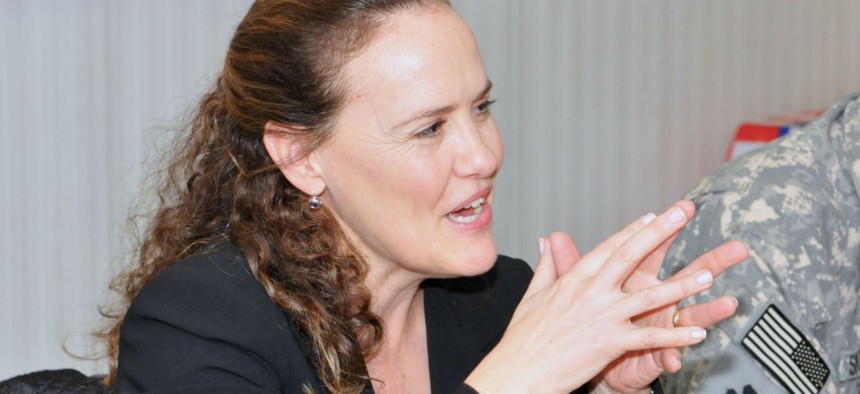
Michele Flournoy, one of the top contenders, visits with troops in Southern Iraq in 2011. Sgt. David Bryant/Defense Department file photo
Who Will Replace Chuck Hagel?
President Obama will be naming his fourth secretary of defense in six years. Will he choose the first woman to run the Pentagon?
Even before Chuck Hagel's resignation from the Defense Department became official, the names of a pair of longtime Pentagon veterans had already surfaced as top contenders to replace him as secretary: Michele Flournoy and Ashton Carter.
Flournoy and Carter have been through this wringer before: Both were floated as possible Pentagon chiefs earlier in Obama's presidency, and both have served at the highest levels of the department. A third candidate, Senator Jack Reed of Rhode Island, said through a spokesman on Monday he was not interested in the post.
In replacing Hagel, President Obama must choose his fourth Defense secretary in less than six years and the first who will face confirmation hearings led by a Republican Senate. His nominee will also be presiding over a military much more deeply engaged overseas than Obama ever hoped or imagined it would be three-quarters of the way through his presidency. American troops are fighting a new war against the Islamic State in Iraq and Syria, even as their combat role in Afghanistan has been extended, and the U.S. military is battling an Ebola epidemic in Africa and eyeing provocations by Russia and China to the east.
Obama has the chance to make a historic choice by selecting Flournoy as the first woman to lead the Defense Department. Now the CEO of the Center for a New American Security, she served in a senior role at the Pentagon in the Clinton administration and then returned to take the department's third-ranking post for most of Obama's first term. Carter has an equally distinguished record, having also served under Clinton before rising to become deputy secretary of Defense in the Obama administration. He left government a year ago after helping Hagel through his transition at the Pentagon.
While Flournoy has come up through the ranks in policy and strategy, Carter's experience is in technology and acquisitions. Stephen Biddle, an adjunct senior defense fellow at the Council on Foreign Relations, said Flournoy and Carter each had a rare combination of policy expertise and managerial experience. "That's a combination that's very hard to find," he said in a phone interview Monday.
The latter quality, Biddle said, is often overlooked as a prerequisite for running the Defense Department and a well-known weakness of Hagel's. "A big part of being secretary of Defense is managing the largest human institution on the planet, and they are exceptionally well-prepared for that," he said of Flournoy and Biddle. "In many ways, its not a fair thing to ask of somebody who hasn’t run a big organization to walk into something of this almost unimaginable size and scale and complexity and scope and dysfunction from day 1."
Yet that is almost exactly what happened when Obama nominated Hagel, a former Republican senator and decorated Vietnam veteran who spent his career as a legislator. After facing strong opposition from one-time friends in his party, namely Senator John McCain, Hagel never really found his footing at the Pentagon, and Republicans said he complained of interference from the White House.
"He was given a thankless task of an underfunded Defense Department, growing threats, and intrusive White House micromanagement," Representative Buck McKeon, chairman of the House Armed Services Committee, said in a statement Monday. “Even with the cards stacked against him, he led the department with efficiency and aplomb."
With Republicans assuming the Senate majority in January, the man who Obama must impress with his nomination is now McCain, his former opponent and longtime critic who will become chairman of the Armed Services Committee. Though he opposed Hagel's nomination, he faulted the White House on Monday for a lack of vision and strategy toward ISIS, Syria, Afghanistan, and Russia. “I hope the president will nominate a secretary of defense with the strength of character, judgment, and independence that Bob Gates, Leon Panetta, and Chuck Hagel all exhibited at their best," McCain said in a statement. "But ultimately, the president needs to realize that the real source of his current failures on national security more often lie with his administration's misguided policies and the role played by his White House in devising and implementing them."
The ongoing conflicts abroad and the need to win approval from Republicans in the Senate could argue for a safe, internal pick for Obama, said Aaron David Miller of the Woodrow Wilson International Center for Scholars. "You want someone who is competent, knows the brief, and can get confirmed easily," Miller said Monday. Robert Work, currently the deputy secretary of Defense and a former undersecretary of the Navy, fits that description.
As a veteran Democratic senator and member of the Armed Services Committee, Reed could probably count on an easy confirmation by his colleagues. But his spokesman, Chip Unruh, said on Monday he was not interested in leaving the Senate for the Pentagon.
"Senator Reed loves his job and wants to continue serving the people of Rhode Island in the United States Senate. He has made it very clear that he does not wish to be considered for secretary of Defense or any other cabinet position. He just asked the people of Rhode Island to hire him for another six year term and plans on honoring that commitment."
Flournoy, Carter, and Reed all won praise from a close McCain ally, as Senator Lindsey Graham tweeted that any of them would be "solid choices" for the job. Other possibilities who were floated on Monday include Richard Danzig, a former Navy secretary who was a top contender for Defense secretary during Obama's first term, and even a former national security adviser to President George W. Bush, Stephen Hadley.






